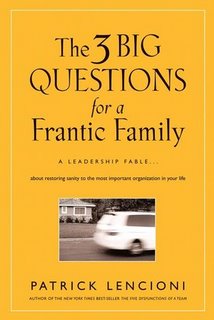How 'bout running your family like you run your business?
 Could your family benefit from being run like a business?
Could your family benefit from being run like a business?That's the premise behind author Patrick Lencioni's latest, "The Three Big Questions for a Frantic Family: A Leadership Fable ... About restoring Sanity to the Most Important Organization in Your Life," (Jossey-Bass, a Wiley Imprint, 2008, $24.95, 208 pp.) (I favorably reviewed Lencioni's book "The Three Signs of a Miserable Job" in January 2008 -- check that review out here.)
While this book is labeled in the "family & relationship/parenting" category, it certainly doesn't hurt to look at it from a business perspective.
Much as he did in "The Three Signs of a Miserable Job," Lencioni uses a simple tale to communicate what might be to some a complicated business concept -- or in this case, an idea for improving family time.
A father of four and business consultant/bestselling author who's often on the road, Lencioni said he tested out his model in his own home. After all, if your family is the most important organization in your life, why wouldn't a business executive apply the tools they use at work to improve the way his/her family functions?
"Family chaos is just a part of life, and so we accept levels of confusion and disorganization and craziness at home that we would not tolerate at work," Lencioni states in the book's introduction. Less chaos, for most families, including a few extremely busy young families I know, would be good.
Lencioni said he and his wife have found benefits to applying a few simple strategic concepts to managing his own family.
"The vast majority of families I know - including my own - wold admit that one or more of the following adjectives apply to them: reactive, scattered, frantic chaotic, stressed," he writes. "And if you were to ask them if they were living their lives with the sense of purpose and intentionality that they want, every last one of them would look at you like you were mocking them and say 'Are you kidding?'"
And so Lencioni has come up with this easy-to-understand fable about a couple who are struggling to keep on top of three kids, school and church obligations, sports and other extracurriculars, and simply finding time to hang out as a family.
The book opens with a frustrated husband, Jude making the following (rather loaded) statement to his stay-at-home wife, Theresa: "If my clients ran their companies the way we run this family, they'd be out of business!" After taking some time to get over her initial indignation, the wife proceeds to investigate that claim.
It all boils down to these three questions a family can live by to restore sanity and clarity. I'll tell you the questions, but it will be in very simplistic and out-of-context form. They're better illustrated by reading this little fable, which you could easily do in a night or two (no matter how busy you are).
1) What makes your family unique? Basically, what makes you you and differentiates you from everyone else on the block.
2) What's your family's top priority (aka rallying cry) right now? That would be your main goal over the next 2 to 6 months, and it could be something like carve out more family time or it could be something like moving to a bigger house. It's the main thing that drives you as a family at this time.
3) How do you talk about and use the answers to these questions? What are you doing to implement the first two questions. Holding weekly family meetings? Keeping a spreadsheet?
How did Theresa and Jude answer these questions and implement the answers? They're "rallying cry" was to spend more time together as a family. That meant Theresa had to said no to taking on a time-consuming post at church. Jude and Theresa decided to cut back on their kids' extracurriculars. They cut back on social activities as well as TV-watching. They made family vacations a priority. And, lastly, Jude decided to cut back in his business travel for the overall benefit of the family.
Then they met weekly for 10 minutes to keep up with it all and adjust as needed. They kept a whiteboard in the kitchen as a reminder of the "rallying cry" and what was needed to achieve it. And, lo and behold, it worked. And they were on to their next "rallying cry," which had to do with helping one of their kids with an attention deficit.
To further illustrate the concept, Lencioni goes through several other "families" and their experiences with the "three big questions." He also notes that his own family is far from picture perfect:
"Well, I have to tell you that the Lencioni family continues to experience its fair share of stress, and we don't expect that to go away anytime soon. But I am glad to report that by answering the questions laid out here, we have begun to channel that stress in a general direction and obtain a sense of progress," he writes.
A good deal of chaos remains, he admits, but "we're being more purposeful now about which chaos to tolerate and which to squash."
I really like his wife's comment at the end of the book:
"When something is part of a bigger goal that I know we're going to be talking about every week, it's harder for me to let it get pushed aside by those pesky, tactical, and artificially urgent things that distract us from what really matters. Now I can let some things go that I would have felt guilty about ignoring in the past when everything was equally important."
Working together toward a pre-determined common goal: Not a novel concept, but one that might help some stressed out family-type folks I know.
Labels: book review, Patrick Lencioni, The Three Big Questions for a Frantic Family, Wiley
 RSS
RSS



0 Comments:
Post a Comment
<< Home